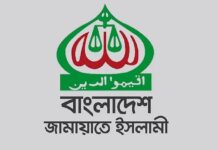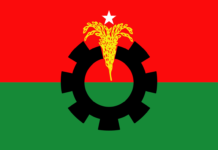Sadeq Khan
Since October 18, when Prime Minister Sheikh Hasina held a fake olive branch to the Opposition offering positions in an “all-party government” from amongst existing parliament members for the election period under her own premiership, followed by the imposition of a declaration of virtual emergency in the capital (later throughout the country) by ban on all outdoor and indoor meetings and processions from October 20, relaxed for limited gathering now and then under opposition pressure and violated daily by lightening appearances of radical activists on the streets, the country has witnessed ever-increasing unrest and violent clashes of a civil war-like nature.
Deaths from political violence as well as police raid of homes and torture of political opposition often involving kidnap, mass arrest and gang cases against unnamed individuals have been piling up since the beginning of the year. On October 21, the Leader of the Opposition in a press conference rejected election under “any” government led by Sheikh Hasina, and made her own counter proposal of an election-time non-party neutral government. The ruling party outright rejected the scope of any election time government outside the preview of the 15th Amendment to the Constitution.
While a false political game of calls for parley between the government and the opposition was maintained in the media and in public utterances of contending camps, the government camp continued its show of preparations for one-sided elections without BNP-led 18-party alliance, against which it intensified repressive measures. The opposition camp also carried on with a series of continuous spells of countrywide general strike, two of 60 hours duration and the latest of 84 hours duration, supplemented by local hartals almost daily here and there, and bloody clashes with the police and musclemen of the ruling camp.
No chance for a deal
Many died. Fire burned down establishments and vehicles. Railway lines were cut-off in many places. By the end of the last phase of countrywide hartal, the comparatively easy-going citizens of the capital protected under huge police, RAB and BGB deployment began to realise that they have been virtually cut off from the rest of the country. There is a five days’ reprieve that they have been spared of the next spell of hartal and siege as reported but not yet officially declared by the opposition camp from November 19. There is little hope, by media predictions and analyses, of any chance of resolution of differences between the two camps by then.
A geopolitical dimension has been added to this gloomy situation, to give an outline of which I quote from a newspaper commentary by a former ambassador and secretary of Bangladesh, Mahmood Hasan: “The Economic Times carried a PTI report dated 8 November, 2013 that President Obama, after meeting Prime Minister Manmohan Singh in Washington, had asked his officials to ‘ramp up consultations’ with India on the political crisis in Bangladesh. A close scrutiny of the four documents released by White House Press Office on September 27 on Manmohan’s visit has no mention of Bangladesh anywhere. Clearly, a section of Indian media is intentionally misleading readers with cooked up stories.
Indian High Commissioner Pankaj Saran called on Prime Minister Sheikh Hasina on October 30 to brief her about the Indian position on the elections. The Indian High Commission said in its November 11 statement said: ‘It is for the people of Bangladesh to decide their own future. India supports holding of free and fair election in Bangladesh.’ Conspicuously, the phrase ‘participation of all parties’ is missing.
The Americans are deeply worried about the political violence. Despite repeated calls by the US State Department to the government to ‘ensure free, fair and credible elections participated by all parties,’ Dhaka seems to have ignored them. In early September, US Secretary of State John Kerry wrote to both Sheikh Hasina and Khaleda Zia urging them to ‘hold constructive dialogue and decide on the election-time government.’
Ambassador Dan Mozena went to Delhi on October 23 for discussions with Indian External Affairs. According to media reports his discussion with Indian High Commissioner Pankaj Saran on October 23 revealed some differences on how to get Sheikh Hasina and Khaleda Zia engaged in constructive dialogue.
Indian media coverage
Indian media reported that Mozena and US Ambassador to India Nancy Powell met with Indian Foreign Secretary Sujatha Singh on October 25. Mozena tried to assess India’s approach to the current situation in Bangladesh. Three issues apparently came up during discussions ensuring ‘peace and stability’ in Bangladesh, the need for ‘free and fair election in which all parties participate,’ and the need to counter ‘extremism and terrorism.’ Mozena left for Washington on October 30 for consultations. Clearly, the Americans and the Indians are ‘not on the same page’ on Bangladesh.
On November 5, US Congressman Steve Chabot, Chairman of the Foreign Affairs Subcommittee on Asia and Pacific, visited Dhaka. Chabot called on Khaleda Zia, Foreign Minister Dipu Moni and, most significantly, Jamaat leader Abdur Razzak. After meeting with Law Minister Shafique Ahmed he said: ‘I am here as an honest observer. I am going to take back what I see to my colleagues in the US Congress.’
As a further follow-up, US Under-Secretary for South and Central Asia, Nisha Desai Biswal (Indian-American), is expected to come to Bangladesh on November 16 to meet government and opposition leaders. Mozena is also expected to be back in Dhaka by then. One has to wait for the outcome of Biswal’s visit.”
The opposition camp has deferred their action programme by two days for Biswal’s visit, but no one expects any improvement of the political stalemate. A senior citizen nearly ninety year of age who lives in the outskirts of Dhaka told me how he was reminded by the present political situation in the country of the 1942 quit India movement of Mahatma Gandhi, when young activists started cutting off telephone and telegraph wires and railway lines to try immobilise the British colonial administration. This time, the mofussil activists of Bangladesh appear to be telling veiled hands of Indian hegemonic presence to quit Bangladesh.
The reality is that Bangladesh is experiencing a virtual collapse of government authority. The Economist of London in its Nov. 9 issue commented: “Opinion polls show that the opposition Bangladesh Nationalist Party (BNP), led by Khaleda Zia, is far more popular than Sheikh Hasina’s own Awami League. Polls suggest support, too, for an independent caretaker government to run the election, to guard against vote-rigging. Sheikh Hasina has refused that, perhaps hoping to provoke a BNP boycott of the poll. If a boycott takes place, then elections could be delayed and street violence is likely in the next few months. If so, the army, which also has the job of providing security at polling stations, would play a decisive political role.” Perhaps the time for a “decisive political role” of the army has come already.
Source: Weekly Holiday










